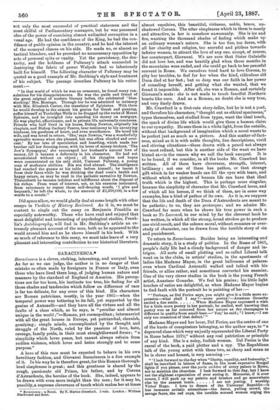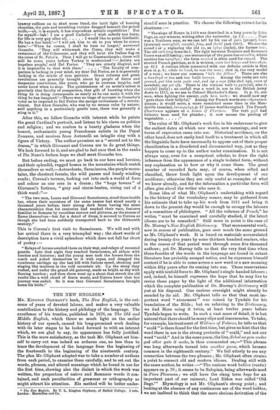SARA.CINESCA. ,
Saracinesca is a clever, striking, interesting, and unequal book. As far as we can judge, the author is in no danger of that mistake so often made by foreigners in France or Italy, even those who have lived there long, of judging human nature and manners by the standard of England or America. His percep- tions are far too keen, his instincts too true, his feeling for all those shades and tendencies which follow on difference of race in far too delicate, for any error of this kind. His characters are Roman patricians, mostly, in the year- 1865—when the temporal power was tottering to its fall, yet supported by the genius of Antonelli—and they have all the virtues and all the faults of a class which, as he says, is "peculiar and almost unique in the world ;"—Roman, yet cosmopolitan ; intermarried with all the great houses in Europe, yet patriarchal, clannish, gossiping; simple minds, uncomplicated by the thought and struggle of the North, ruled by the passions of love, bate, revenge, family pride, in their most straightforward forms; "a simplicity which loves peace, but cannot always refrain from sudden violence, which loves and hates strongly and to some purpose."
A hero of this race must be expected to behave in his own hereditary fashion, and Giovanni Saracinesca is a fine example of it. In his way he is therefore great, for this Roman thorough- bred simpleness is great; and this greatness is shared by the rough, passionate old Prince, his father, and by Corona d'Astrardente, the heroine of the book. She, indeed, appears to be drawn with even more insight than the men; for it may be, possibly, a supreme cleverness of touch which makes her at times
• &mann.: • NoveL By F. Marion Crawford. 3 ram. London William Blackwood and Bona.
almost repulsive, this beautiful, virtuous, noble, brave, nn- shadowed Corona. The utter simpleness which in them is manly and attractive, in her is somehow unwomanly. She is ice and fire, wanting the thousand shades of feeling which make up. an ordinary woman's nature. She is too fine, too fierce, with all her charity and religion, too scornful and pitiless towards inferior women, to attract the love of any one, except, of course, her counterpart, Giovanni. We are sure that Sister Gabrielle did not love her, and was heartily glad when those months in the mountains were ended, and she could go back to her peaceful convent in Rome. We ourselves tried hard to love Corona, to pity her troubles, to feel for her when the kind, ridiculous old Dace died at her feet ; but so deep was our faith in her power of consoling herself, and getting what she wanted, that we found it impossible. After all, she was a Roman, and certainly Giovanni's mate: she is not made to touch fanciful Northern hearts like ours. And as a Roman, no doubt she is very true, and very finely drawn.
Mr. Crawford is a first-rate story-teller, but he is not a poet,- and therefore his characters," thought out as ethical specimens," types themselves, and studied from types, want the ideal touch, the spark of divine life which would give them a human claim to our sympathy. He sees them in a white light, from the outside,. without that background of imagination which a novel wants Lo- be perfect just as much as a picture. And this matter-of-fact- ness, mixed as it is with noble thoughts, fine descriptions, vivid and stirring situations—these drawn with a pencil not always the most refined, but this is another aide of the want we have hinted at—is the reason why we call the book unequal. It is to be found, if we consider, in all the books Mr. Crawford has written. All of them have cleverness, strength, interest, brilliancy ; not one of them has pathos, or that strange gift which in far weaker hands can fill the eyes with tears, and without which no picture of human life can have that ideal truth which is the highest. This is perhaps more singular, because the simplicity of character that Mr. Crawford loves, and of which all his heroes, if we think of them, are in some way examples, has a kind of pathos of its own. As it is, we suppose that the life and death of the Puce d'Astrardente are meant to be pathetic ; to us, they are grotesque; and we admire Mr. Crawford far more when he shows his true power in such a book as To Leeward, to our mind by far the cleverest book he- has written, in which all the strong, broad strokes go to produce one vivid result, and the solemn moral, without romance or over. study of character, can be drawn from the terrible story of sin and punishment.
To return to Saracinesca. Besides being an interesting and dramatic story, it is a study of politics. In the Rome of 1865,, people's daily life had a cloudy background of danger and in- trigue. All sorts of small plotting and so.called Liberal talk went on in the clubs, in artists' studios, in the apartments of ladies like Madame Mayer, in the great ballrooms of palaces, even where Cardinal .A.ntonelli walked and talked with his friends, or allies rather, and sometimes converted his enemies.- One of the very clever studies in the book is the young French artist, Anaetase Gouache. We feel his genius; his little light touches of satire are delightful, as when Madame Mayer begins to find fault with the portrait he is painting of her :—
" ' Perhaps, as Del Fence says, you might give it a little more ex- pression—what shall I say ?—more poetry.'—Anastase Gouache smiled a fine smile When Madame Mayer expressed a wish, for a little more poetry in her portrait, he smiled, well knowing that poetry was as far removed from her nature as dry champagne is different in quality from amall.beer.—' Yes,' be said ; '1 know,—I ant only too conscious of that defect.'" Madame Mayer and her lover, Del Fence, are the centre of one of the knots of conspirators belonging, as the author says, to "a depraved class which very unjustly represented the Liberal Party in Rome before 1870," without any real patriotism or principle, of any kind. She is a noisy, foolish woman. Del Fence is the rascal of the book, a paid plotter and a spy. The Republican talk of the young artist with these two, as sharp and mean as he is clever and honest, is very amusing :- "1 look forward to the day when "liberty, equality, and fraternity," shall be inscribed in letters of flame, in the most expensive Bengal lights if you please, over the ports cochelre of every palace in Rome, not to mention the churches. I look forward to that day, but I have not the slightest expectation of ever seeing it. Moreover, if it ever cornea, I will pack up my palette and brushes and go somewhere else by the nearest roots I am not jesting. I worship. Victor Hugo. I love to dream of the Universal Reptiblie—it has immense artistic attractions—the fierce, yelling crowd, the savage faces, the red caps, the terrible mtemel women urging the brawny ruffians on to shed more blood, the lurid light of burning churches, the pale and trembling victims dragged beneath the poised knife,—ah, it is superb, it has stupendous artistic capabilities! But for myself—bah ! I am a good Catholic—I wish nobody any harm, for life is very gay after all. . . . . . I would like to paint Garibaldi. He has a fine head.'—' I will ask him to sit to you when he comes here.'—` When he comes, I shall be here no longer,' answered Gouache. 'They will whitewash the Corso, they will make a restaurant of the Colosseum, and they will hoist the Italian flag on the cross of St. Peter's. Then I will go to Constantinople; there will still be some years before Turkey is modernised.'—` Artists are
hopeless people,' said Del Fence. They are utterly illogical, and
it is impossible to deal with them.' The faculty of com- parison is lacking in your mind, my dear Del Feriae, as it is generally lacking in the minds of true patriots. Great reforms and great revolutions are generally brought about by people of fierce and desperate convictions like yours, who go to extreme lengths, and never know when to ;top. The quinteasence a an artist's talent is precisely that faculty of comparison, that gift of knowing when the thing he is doing corresponds as nearly as he can make it with the thing he has imagined.'—There was no tinge of sarcasm in Gouache's voice as he imputed to Del Fence the savage enthusiasm of a revolu- tionist. But when Gouache, who was by no mean, calm by nature, said anything in a particularly gentle tone, there was generally a cling in it."
After this, we follow Gouache with interest while he paints the great Cardinal's portrait, and listens to his views on politics and religion and we confess to a hearty gladness when the honest, enthusiastic young Frenchman enlists in the Papal Zouaves, and receives from Antonelli an intaglio ring with a figure of Victory. The author promises us a "second act to the drama," in which Giovanni and Corona are to do great things. We look forward to it, and are glad to feel sure that in the ranks of Pio Nono's forlorn hope we shall meet Gouache too.
But before ending, we must go back to our hero and heroine, and their splendid, rugged homes in the mountains which match themselves so well,—Astrardente, Saracinesca, the purple moun- tains, the chestnut forests, the- wild passes and lonely winding roads ; Corona's terrace, looking out into ouch a world of form and colour as one sees in a dream, the "huge towers " of Giovanni's fortress, "grey and storm-beaten, rising out of a thick wood :"—
" The two men, Leone and Giovanni Saracinesca, stood there beside her, where their ancestors of the same names had stood nearly a thousand years before, their strong dark faces having the same characteristics that for centuries had marked their race, features familiar to Romans by countless statue, and pictures, as the stones of Rome themselves—but for a detail of dress, it seemed to Corona as though she had been suddenly transported back to the thirteenth Century."
This is Corona's first visit to Saracinesca. We will end with her arrival there in a very triumphal way ; the short words of description have a. vivid splendour which does not fall far short of poetry, :— " Belays of homes awaited them on their way, and relays of mounted guards. Late that night they reached Saracinesca, all ablaze with torchee and lanterns ; and the young men took the horses from the coach and yoked themselves to it with ropes, and dragged the cumbrous carriage up the last hill with furious speed, shouting and Singing like madmen in the cold mountain air. Up the steep they rushed, and under the grand old gateway, made as bright as day with flaming torches ; and then there went up a shoat that struck the old vaults like a wild chord of fierce music, and Corona knew that her journey was ended. So it was that Giovanni Saracinesca brought home hie bride."



































 Previous page
Previous page